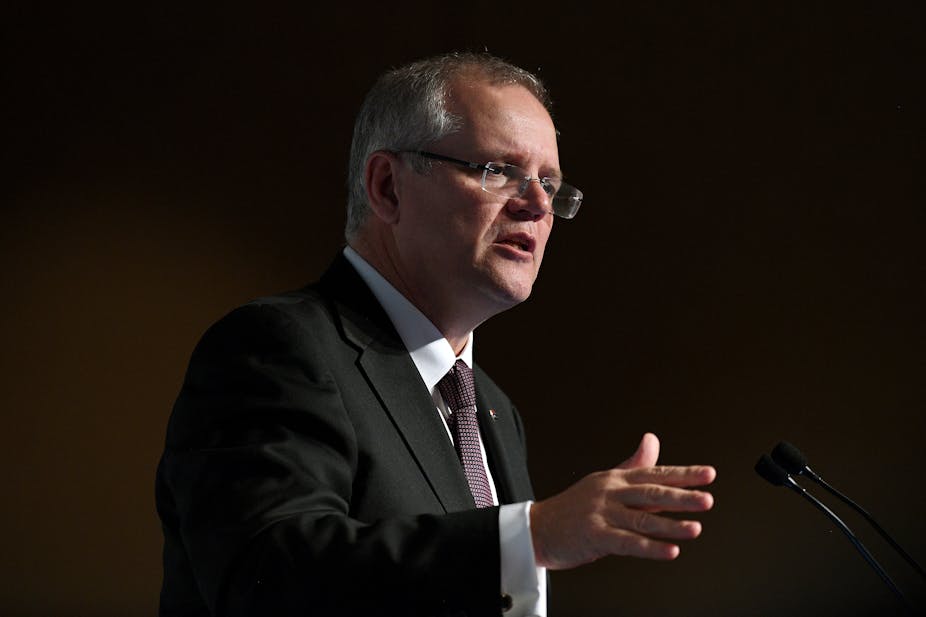Treasurer Scott Morrison will renew his warnings against tampering with negative gearing, in a speech on Monday urging more institutional investment in both rental residential real estate and affordable housing for low-income earners.
As the government prepares its housing package for the May budget, Morrison will also seek to keep expectations realistic, saying one budget cannot turn around the various affordability issues in isolation.
“There are no single or easy solutions and the payback is achieved in some cases over a generation – not an electoral or budget cycles,” Morrison says in the speech, a copy of which was released ahead of delivery.
The policy response on housing “must be careful and calibrated, lest we spark a negative housing shock that would undermine our economic confidence, negatively impact household consumption and retard economic growth,” he says.
“The more-than-two-thirds of Australians who live in owner-occupied homes would agree that dramatically reducing the value of their home is not a good plan, and it is not the government’s plan.”
The escalating prices in Sydney and Melbourne in particular have led to widespread calls for the government to soften its opposition to changing negative gearing but it has dug in. There is, however, internal debate in government circles about whether to change the capital gains discount.
Morrison says the response on housing must be comprehensive – because there is no silver bullet – and involve all levels of government, with co-ordinated action. It must first remove the range of obstacles restricting supply.
“We don’t claim instantly affordable housing,” he says. “Anyone making such claims would soon be found out and rightly punished for it.”
He says the rental sector has not escaped affordability challenges even though rent increases have not mirrored those of housing prices.
About 47% of low-income rental households in the capital cities spend more than 30% of their household income on housing costs.
Higher house prices are making it harder for potential buyers to move into ownership, he says, and this means they are staying in the rental market longer. That puts pressure on rents and availability and even more pressure on lower-income households, increasing the need for affordable housing for them.
More housing is needed not just for homeowners but for renters – “for key workers such as nurses, teachers and police officers who can’t afford to rent or buy in the communities they serve and for those on low incomes, the disabled and the disadvantaged.”
Morrison once again will attack the performance of the National Affordable Housing Agreement, as not adequately delivering.
Rental yields for investors are 2.1% in Melbourne and 1.8% in Sydney, and less for affordable and social housing stock.
Despite low yields, 27% of Australian housing stock is owned by investors. This compares with 18% in the UK. Unlike Australia, there is greater institutional ownership of residential real estate in the UK and even more in Europe and the US, Morrison points out.
“Here, our private rental stock is owned by mums and dads.”
“Figures to be released later this week show two million taxpayers in Australia have an interest in a residential investment property. 72% own just one property and 90% own no more than two. Just over 1.3 million of these taxpayers negatively gear their investments, including 58,000 teachers and one in five police officers. Two-thirds of those taxpayers who negatively gear their investments have a taxable income of $80,000 or less.”
In the UK, where there is no negative gearing, rent as a percentage of income is on average 25% higher than in Australia, Morrison says.
“Australian residential property investment is more geared to capital gain than yield.
"If mum and dad investors were not part of our private rental market, there would be fewer rental properties available, meaning higher rents, further crowding out of those on lower incomes and even greater pressure on already over-stressed community and social housing resources.
"Regardless of one’s opinions of the merits or otherwise of negative gearing, it is an established and structural component of Australia’s housing markets. Disrupting negative gearing would not come without a cost, especially to renters, let alone the wider economic impacts. Proponents of disruptive negative gearing changes have ignored this fact,” he says.
“This would not be good for the 30% of Australian households who rent.”
But Morrison says attention needs to be paid to how there could be more institutional involvement in rental residential real estate. “This would diversify the basis of ownership and inoculate risk, while potentially delivering greater stability and certainty as well as greater innovation in product offerings.”
It would need to be fundamentally driven by the private sector.
A variety of reforms is also required to increase the supply of affordable rental housing for key workers and those on low incomes, he says. A housing bond aggregator is one being examined. This model aggregates and sources capital from the bond market for lower-interest, long-term loans to providers.
Morrison says he hopes an appetite can be cultivated among Australian super funds for investment in affordable housing. “What could be more in the interest of nurses, teachers or police pension fund members than investing in affordable housing for nurses, teachers and police officers?”
“As with residential real estate, this will require the same prerequisites to establish a new institutional investment class. However, more specifically for affordable housing, it will require de-risking the income stream and mitigating tenant risk.
"There are a series of options available for government to provide greater certainty in this area,” he says.

